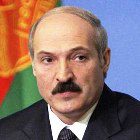
– Two opposition leaders beaten
– Tens of thousands gather in Minsk’s Independence Square
– Lukashenko claims 79 per cent of poll
– Index on Censorship told of 31 detentions prior to demonstrations
Belarus Free Theatre founders arrested
Up to 600 protestors detained
As the world’s attention turns to Europe’s last dictatorship, Index’s Mike Harris explains the bakground to today’s demonstrations
“Fuck Realpolitik” read the T-shirts presented to Index on Censorship staff by the Belarus Free Theatre after their Zone of Silence performance at the Young Vic on 5 December.
For Belarussians their nation’s politics often seems to be a rehearsed game played out by two big actors; Russia and the EU. Earlier in the year there was real optimism amongst those opposed to the regime of President Lukashenko after the Kremlin became increasingly tired of their old ally. The President had made the unforgivable error of refusing to recognise separatist Georgian enclaves. He had also become a bit of a regional embarrassment with his unfortunate habit of playing the pantomime villain by cosying up to every vile dictator from Mugabe, through to Ahmedinejad and Chavez. Russian TV showed films such as “Godbatka” about the suspicious disappearance of opponents. Lukashenko’s anti-Semitism, which takes the form of turning Jewish holy sites into multi-storey car parks has even been discussed with Russian broadcasters comparing him to Hitler. As Belarus lost around 1 in 3 of its people during World War 2, it’s sharp criticism.
Here’s where the realpolitik kicks in. With souring relations with Russia, the EU moved to court Lukaskenko. The foreign ministers of Germany and Poland proposed a potential $3.5 billion EU aid package, in return for ‘free and fair’ elections. It’s a bad deal for taxpayers. Knowing the opposition had little chance of uniting behind a single candidate (there are 9 opposition candidates in all) and with dissent smothered by his police state during his current 4 year term, Lukashenko had little to lose by running a relatively “free” election.
And there have been some significant changes since the last Presidential elections in 2006. For the first time, opposition candidates were given access to state-run television. There was even a televised debate on government-controlled television, albeit one which Lukashenko deigned not to attend. Candidates have also held huge public rallies, a sea-change since 2006, with hundreds of thousands of people queuing to co-sign their candidates’ election papers.
Yet, like every election since 1996 there have been serious electoral irregularities. Soldiers and students have been forced to vote early with lecturers demanding their students accompany them to the polls. An anonymous article by a former polling station worker claimed that electoral lists are topped up by 10 – 12 per cent with the names of government employees and teachers (both groups traditionally loyal to the President) from other districts in order to grant them 2nd votes, after they have cast their 1st vote elsewhere.
As IFEX reported a year ago [pdf], there is little independent media. In this environment, it’s been near impossible for candidates to build the profile they need to take on Lukashenko.
The internet has made a huge difference in aiding the opposition. It’s notable and tragic that the founder of the Charter97 website Oleg Bebenin was found dead in suspicious circumstances just 3 months before the Presidential elections.
Opposition activists told Index in advance they would hold a huge rally in Minsk square. The result of the election in a country with little free expression was known far in advance. For those camped out tonight in the centre of Minsk in the freezing cold, they have one message to the West: “Fuck realpolitik”.





